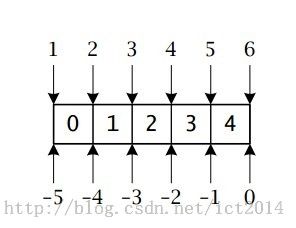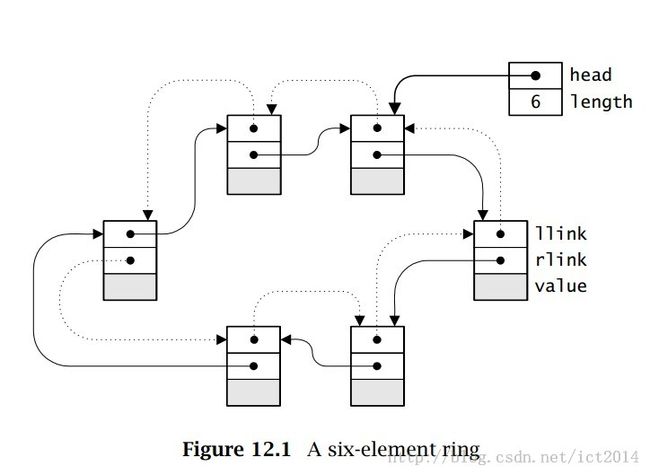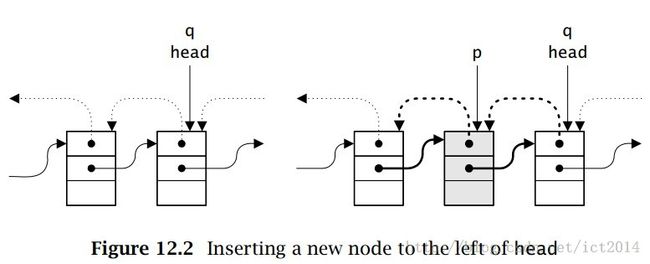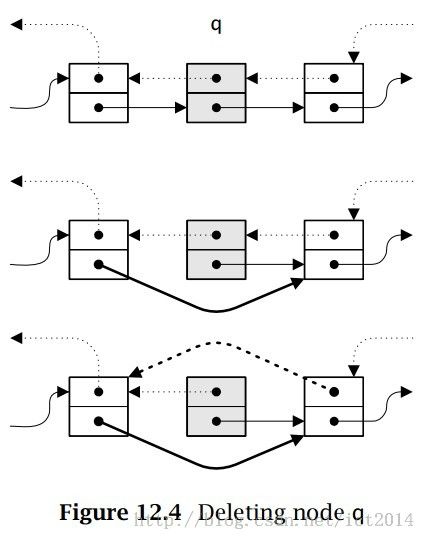C.Interface.And.Implementations—ring的实现
1、A ring is much like a sequence: It holds N values associated with the integer indices zero through N −1 when N is positive.
2、An empty ring holds no values. Values are pointers.
3、Like the values in a sequence, values in a ring may be accessed by indexing.
4、Unlike a sequence, however, values can be added to a ring anywhere , and any value in a ring can be removed. 5、In addition, the values can be renumbered: “rotating” a ring left decrements the index of each value by one modulo the length of the ring; rotating it right increments the indi-ces by one modulo the ring length.
6、The price for the flexibility of adding values to and removing values from arbitrary locations in a ring is that accessing the i th value is not guaranteed to take constant time.
简单而言,ring就是一个“环”,底层用“双向链表”进行实现。
在环中的位置定义:
一个带有六个元素的示意图:
插入一个新结点的示意图:
删除结点的示意图:
=========================ring.h=========================
#ifndef RING_INCLUDED #define RING_INCLUDED #define T Ring_T typedef struct T *T; //exported functions extern T Ring_new (void); extern T Ring_ring (void *x, ...); extern void Ring_free (T *ring); extern int Ring_length(T ring); extern void *Ring_get (T ring, int i); extern void *Ring_put (T ring, int i, void *x); extern void *Ring_add (T ring, int pos, void *x); extern void *Ring_addlo (T ring, void *x); extern void *Ring_addhi (T ring, void *x); extern void *Ring_remove(T ring, int i); extern void *Ring_remlo (T ring); extern void *Ring_remhi (T ring); extern void Ring_rotate(T ring, int n); #undef T #endif
========================ring.c=============================
#include <stdlib.h>
#include <stdarg.h>
#include <string.h>
#include "assert.h"
#include "ring.h"
#include "mem.h"
#define T Ring_T
struct T{
struct node{
struct node *llink, *rlink;
void *value;
} *head;
int length;
};
//functions
T Ring_new(void){
T ring;
NEW0(ring);
ring->head = NULL;
return ring;
}
T Ring_ring(void *x, ...){
va_list ap;
T ring = Ring_new();
va_start(ap, x);
for(; x; x = va_arg(ap, void *))
Ring_addhi(ring, x);
va_end(ap);
return ring;
}
void Ring_free(T *ring){
struct node *p, *q;
assert(ring && *ring);
if((p = (*ring)->head) != NULL){
int n = (*ring)->length;
for(; n-- > 0; p = q){
q = p->rlink;
FREE(p);
}
}
FREE(*ring);
}
int Ring_length(T ring){
assert(ring);
return ring->length;
}
void *Ring_get(T ring, int i){
struct node *q;
assert(ring);
assert(i >= 0 && i < ring->length);
//q <- ith node
{
int n;
q = ring->head;
if(i < ring->length/2){
for(n = i; n-- > 0; )
q = q->rlink;
}else{
for(n = ring->length - i; n-- > 0; )
q = q->llink;
}
}
return q->value;
}
void *Ring_put(T ring, int i, void *x){
struct node *q;
void *prev;
assert(ring);
assert(i >= 0 && i < ring->length);
//q <- ith node
{
int n;
q = ring->head;
if(i <= ring->length/2){
for(n = i; n-- > 0; )
q = q->rlink;
}else{
for(n = ring->length - i; n-- > 0; )
q = q->llink;
}
}
prev = q->value;
q->value = x;
return prev;
}
void *Ring_addhi(T ring, void *x){
struct node *p, *q;
assert(ring);
NEW(p);
if((q = ring->head) != NULL){
p->llink = q->llink;
q->llink->rlink = p;
p->rlink = q;
q->llink = p;
}else{
ring->head = p->llink = p->rlink = p;
}
ring->length++;
return p->value = x;
}
void *Ring_addlo(T ring, void *x){
assert(ring);
Ring_addhi(ring, x);
ring->head = ring->head->llink;
return x;
}
void *Ring_add(T ring, int pos, void *x){
assert(ring);
assert(pos >= -ring->length &&
pos <= ring->length+1);
if(pos == 1 || pos == -ring->length)
return Ring_addlo(ring, x);
else if(pos == 0 || pos == ring->length + 1)
return Ring_addhi(ring, x);
else{
struct node *p, *q;
int i = pos < 0 ? pos + ring->length : pos - 1;
//q <- ith node
{
int n;
q = ring->head;
if(i <= ring->length/2){
for(n = i; n-- > 0; )
q = q->rlink;
}else{
for(n = ring->length - i; n-- > 0; )
q = q->llink;
}
}
NEW(p);
//insert p to the left of q
{
p->llink = q->llink;
q->llink->rlink = p;
p->rlink = q;
q->llink = p;
}
ring->length++;
return p->value = x;
}
}
void *Ring_remove(T ring, int i){
void *x;
struct node *q;
assert(ring);
assert(ring->length > 0);
assert(i >= 0 && i < ring->length);
//q <- ith node
if(i == 0)
ring->head = ring->head->rlink;
x = q->value;
//delete node q
q->llink->rlink = q->rlink;
q->rlink->llink = q->llink;
FREE(q);
if(--ring->length == 0)
ring->head = NULL;
return x;
}
void *Ring_remhi(T ring){
void *x;
struct node *q;
assert(ring);
assert(ring->length > 0);
q = ring->head->llink;
x = q->value;
//delete node q
q->llink->rlink = q->rlink;
q->rlink->llink = q->llink;
FREE(q);
if(--ring->length == 0)
ring->head = NULL;
return x;
}
void *Ring_remlo(T ring){
assert(ring);
assert(ring->length > 0);
ring->head = ring->head->rlink;
return Ring_remhi(ring);
}
void Ring_rotate(T ring, int n){
struct node *q;
int i;
assert(ring);
assert(n >= -ring->length &&
n <= ring->length);
if(n >= 0)
i = n%ring->length;
else
i = n + ring->length;
//q <- ith node
{
int n;
q = ring->head;
if( i <= ring->length/2){
for(n = i; n-- > 0; )
q = q->rlink;
}else{
for(n = ring->length - i; n-- > 0; )
q = q->llink;
}
}
ring->head = q;
}




